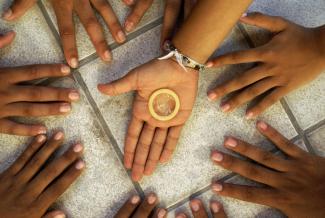Schools
Indispensable lessons

The young generation is not necessarily underserved in terms of sex education intentionally. The big obstacle is socio-cultural taboos. Many parents, teachers and policymakers are uncomfortable with the topic. Calling it “family lifestyle education” or “family planning information” only helps marginally.
Nonetheless, any money invested in sex education is well spent. There is a triple bottom line. Proper knowledge serves the adolescents today, will benefit them as adults and is likely to contribute to their children’s health.
Adolescents experience complex physical, biological and emotional changes. Puberty has impacts on the body, the mind and the behaviour. Yet the stigma around discussing matters of a sexual nature prevents open and nurturing counselling. Typically, neither parents nor teachers assume responsibility for providing the information. Nor do faith leaders or other persons in positions of authority.
Thus adolescents often only get unreliable information. They depend on what their peers tell them and what they find in the media, which, in the age of internet, is often explicit pornography. Young people who are grappling with physical and mental change need more than rumours and fantasies. Unfortunately, TV programming tends to be poor and inadequate, and many websites are simply awful. Instead of harmless entertainment, adolescents are exposed to distorted role models and destructive narratives. The harmful results are:
- irresponsible sexual behaviour, including violence and rape,
- early marriages,
- unwanted pregnancies,
- abortions, many of which are unsafe and illegal, and
- infections with HIV/AIDS and other sexually transmitted diseases.
Good sex education must inform adolescents about health risks, contraceptive options and emotional aspects of intimacy. Girls need sex education even more than boys. They are the ones who can become pregnant, and they are the ones who get stigmatised for being sexually active. They are also more at risk of violence and infections. According to UNICEF, around 15 million adolescent girls aged 15 to 19 have experienced forced sex. Many of them were never told what consent means. Their self-confidence would benefit from such knowledge. Shame fosters when they do not understand that any sexual transgression that happens against their will is unacceptable and not their personal fault.
India is a technologically advanced country but most of its schools are not on board with sex education. Attempts to introduce sex education at the right age have been derided as violating the country’s culture and values. As elsewhere in the world, conservative leaders argue that sex education entices teenagers to become sexually active. The irony is that young people in many countries are actually becoming sexually active earlier than their parents did, but far too many of them neither understand what they are doing nor what consequences may await them. It is alarming that, according to UNICEF, half of the 15 to 19 year olds with HIV infections are from six countries: South Africa, Nigeria, Kenya, India, Mozambique and Tanzania.
Of course, sex education is controversial in high-income countries too. Teenage pregnancy rates are high in the USA, where religious conservatives have been fighting sex education for decades. According to the New York Times, teen pregnancies dropped by 41 % after President Barack Obama introduced a comprehensive sex-education programme. The number is likely to rise again as President Donald Trump has discontinued his predecessor’s programme.
Health for all is one of the Sustainable Development Goals the UN has promised to achieve by 2030. Without competent sex education, that will not happen.
Aditi Roy Ghatak is a Kolkata-based business journalist.
aroyghatak1956@gmail.com















